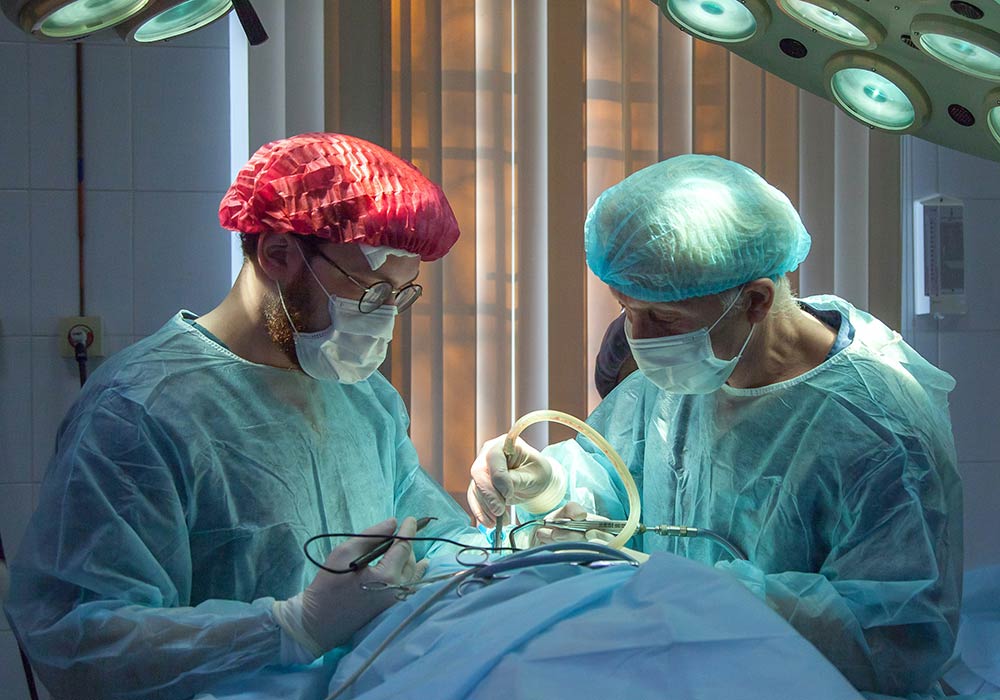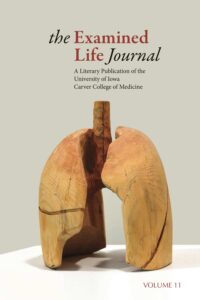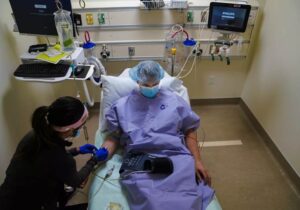I nearly lost my husband last summer after his surgery for a hiatal hernia (when the stomach breaches into the esophagus). His recovery was not going well and I feared he would just slip away. Now, one year later I’m happy to report my husband is doing well; I am no longer worried he will die from post-surgery complications. Looking back on this experience, however, it is difficult to not feel angry and frustrated by all that went wrong.
Here’s a snapshot of mistakes that were made:
During surgery, when CO2 was injected to open his body cavity for better visibility to the internal organs, some of the CO2 was injected just under the skin causing my husband to blow up like the Michelin Man. In recovery, his face was so swollen his eyes were sealed shut. Nurses and techs scrambled to press cold towels on his face to reduce the swelling. He spent a much longer time in recovery than anticipated as they waited for the swelling to decrease.
My husband has two titanium plates in his neck from a previous surgery that limits how far he can tilt his head back. This information was communicated and discussed with the surgeon prior to the procedure since my husband would need to be intubated during surgery. And yet, when he was anesthetized, his head was tilted beyond a limit he would normally tolerate causing excruciating neck pain once he awoke from the anesthesia.
Upon discharge from the hospital, my husband had a drain attached to his abdomen. The drain works on suction and its purpose is to draw fluid from the chest cavity, which is normal after surgery. Once home, my husband began experiencing agonizing pain in his groin area. He described it as a sharp, stabbing pain. The surgeon dismissed the concern as normal post-op pain. In any position – sitting, standing, walking – the pain persisted becoming quite debilitating. Nearly two weeks post-surgery, after yet another phone call to the doctor’s office, an x-ray image revealed the end of the drain was in the groin area, not the chest cavity as intended. The surgeon claimed the drain migrated. A nurse removed the drain, and the relief from the stabbing pain was immediate.
My husband has a history of back issues (two back surgeries, titanium plates in his neck) due to a degenerative spine. He has found regular exercise for his back essential as preventative therapy for back pain. The surgeon cautioned against exercises such as sit-ups post-surgery that would cause strain on the abdominal area. His concern was certain physical movements could undo the surgery. When my husband asked what exercises might be acceptable, he was told planks and walking. The surgeon refused to prescribe physical therapy claiming a physical therapist would just give him a kettle ball to swing around.
Clearly, mistakes were made. Incidents such as the CO2 and the head tilting were preventable medical errors. It’s difficult to know whether or not the drain migrated or was misplaced but it certainly was not where it was supposed to be, causing havoc with his internal organs. And the refusal to work with physical therapy professionals to develop an appropriate post-surgical exercise plan is simply beyond comprehension.
And sadly, research shows my husband’s experience is not the rare exception. According to a recent study in the New England Journal of Medicine, nearly one-fourth of hospital admissions (23.6%) result in an adverse event (defined as an unintended physical injury resulting from or contributed to by medical care that requires additional monitoring, treatment, or hospitalization, or that results in death). The authors note, this percentage is most likely much lower than the actual number given that many U.S. hospitals “…rely on voluntary reporting of adverse events.”
Choose elective surgery with caution.
- Surgery is an invasive procedure
- As we age, recovery can take longer, and be more problematic with unintended complications causing collateral damage
- U.S. hospitals are under-staffed and are populated with more acute patients which can impact the quality of care
- Consider surgery vs. no surgery in the context of impact on quality of life
Get a second opinion when a surgeon recommends surgery
- Many surgeons are biased towards performing surgery
- A second consult can provide more information to help with decision-making by offering another perspective, other options, or even confirming the initial recommendation
- Sometimes finding an opening with a specialist can take months. In that case, schedule an appointment for a phone or video consultation. Insurance will often cover an additional consult, and for some surgeries, may be mandatory.
Find a surgeon with years of surgical experience on the specific procedure
- Experience matters
- A surgeon who excels at conducting the specific procedure will also know what to do when a situation doesn’t go according to plan
Be fully informed on the surgical procedure
- Ensure the surgeon explains in detail how the surgery will be performed
- Conduct your own research on the procedure. Why?
- Provides context on what is supposed to happen versus what may actually occur
- Provides perspective on potential side effects, secondary impacts
- Provides insight on questions to ask the surgeon
Avoid holidays when scheduling surgery
- If there are post-surgery complications, it’s important the surgeon is available for any questions and concerns. Holidays guarantee limited access and availability
- Avoid scheduling surgery before a surgeon’s out of office or vacation days
Communication is essential
- Ensure the surgeon is informed of any previous surgeries, and any current medications – discuss any potential impact on surgery or recovery.
- Ask questions, share your concerns.
- If you feel dismissed or not heard, find another surgeon.
My hope for everyone – if you must have surgery, all goes well. It may not be possible to prevent all adverse events but taking the recommendations listed above can pave the way for better outcomes.
Click here to read my Op/Ed from the San Diego Union-Tribune on this topic.



